As Libya celebrates the 40th anniversary of Colonel Muammer Qadafi's coup after welcoming the Lockerbie bomber back home, some western leaders may be rethinking their commercial ties with the maverick Mediterranean state.
This week's big party in Tripoli was attended by neither western heads of state nor the Libyan people, although it was ostensibly staged for the benefit of both. World leaders snubbed invitations in irritation over the hero's welcome accorded Abdelbasset al Megrahi, the former Libyan agent convicted of blowing the plane from the sky, after his release from prison in Scotland on compassionate grounds. Locals were kept away from the lavish parade and stageshow honouring Mr Qadafi because of security concerns.
Six years after Mr Qadafi renounced weapons of mass destruction and apologised for the bombing of a Pan Am airliner as it flew over the Scottish town of Lockerbie, and five years after the US and UN lifted most of their sanctions against Libya, relations between Tripoli and the West remain fragile. Libya's reintegration into the international fold has not gone as smoothly as many had hoped, largely because Mr Qadafi's regime has shown a penchant for spicing its business relations with politics, forming an unpredictable and sometimes explosive mix.
In the latest reminder of this, Libya has demanded about US$800,000 (Dh2.9 million) as a condition for allowing two Swiss businessmen to return home. The pair sought refuge in the nearly deserted Swiss embassy in Tripoli more than a year ago, after they were accused of immigration offences, briefly imprisoned and banned from leaving Libya. The accusations against Max Goeldi, a director of the Swedish-Swiss engineering company ABB, and Rachid Hamdani, a Swiss employee of a small construction firm, closely followed the arrest last year of one of Colonel Qadafi's sons in a luxury hotel in Geneva.
Swiss police arrested Hannibal Qadafi and his wife, Aline, after receiving reports that the couple had abused their two servants. That triggered a diplomatic stand-off between Switzerland and Libya that has persisted despite an official Swiss apology. In the past year, Tripoli has imposed a freeze on Swiss business, withdrawn $5 billion in assets from Swiss banks, banned Swiss flights to Tripoli, cancelled oil deliveries to Switzerland and refused a visa to the new Swiss ambassador.
Last week, however, the impasse seemed on the verge of resolution as Swiss authorities said Hans-Rudolf Merz, the president of Switzerland, had received a "written assurance" that the businessmen would be allowed to leave Libya before the end of last month. But Abdelrahman Shalgam, the Libyan foreign minister, said on Sunday the two would have to meet the public prosecutor before being allowed to go home. That meeting has yet to be scheduled.
Apart from their desire to defuse the international security threat that Libya once posed, western governments also sought rapprochement with Tripoli to gain access to the country's more than 43 billion barrels of oil reserves, the largest in Africa. Libya has held four oil and gas licensing rounds in the past four years, attracting major oil companies from around the world, as well as some smaller ones, and has brokered deals with Royal Dutch Shell and BP. But western energy firms' efforts to operate in the country have been as prone to disruption as Switzerland's imports of Libyan crude.
"Libya has a reputation of using access to its resources as a political tool, as well as to threaten international oil companies (IOCs) in commercial negotiations with legal and political repercussions," says Samuel Ciszuk, the MENA energy analyst for the consulting firm IHS Global Insight. "A pattern of using its oil and gas reserves for political ends has continued to be practised, paired with a tendency to renege on legal and commercial obligations to IOCs by applying political pressure to influence negotiations with the companies in question, or with their home governments."
Examples of the difficulties foreign oil firms face include labour laws requiring them to hire Libyan nationals even when they lack the appropriate skills, a mess of competing ownership claims for Libyan real estate that can turn even the simple task of setting up an office into a nightmare, and heavy customs duties for importing equipment. Contractual exemptions from duties are usually ignored by corrupt and underpaid customs officials.
Serious problems stem from Libya's overloaded bureaucratic system. Even routine requests regarding field operations normally require clearance from top officials, so supplies and spare parts run out before the paperwork for restocking them can be completed. This compromises operational efficiency and oilfield safety, for which Libya's record is among the worst in the world. This year, when Libya's National Oil Corporation (NOC) was trying to renegotiate production-sharing agreements with a number of foreign oil firms, its parliament, the Basic People's Congresses, suddenly called for full nationalisation of the oil and gas sector. The radical policy suggestion was dropped after oil companies signed new contracts giving NOC a bigger share of oil revenues.
But to be fair, it is not just western oil interests in Libya that have suffered from political interference. In 2007, Alexander Tsygankov, the chief representative in Libya of Russia's Lukoil, was jailed during negotiations between Lukoil and NOC. Libyan authorities have never offered an explanation for his incarceration. International interest in Libya's oil and gas resources may be waning, especially as there have been few major discoveries in the era since sanctions were lifted.
The country's last oil and gas bidding round, in 2007, attracted tepid interest from western firms, with most of the awards going to state-controlled companies such as Russia's Gazprom and Algeria's Sonatrach. They can tolerate lower returns on investment. Despite flat oil production capacity of about 1.8 million barrels per day (bpd) for the past three years, well below the government's official target of pumping 3 million bpd by 2015, no further auction is on the cards.
Analysts also say the NOC is dragging its feet on approving foreign oil companies' development plans, due to funding pressures during the downturn. @Email:tcarlisle@thenational.ae

